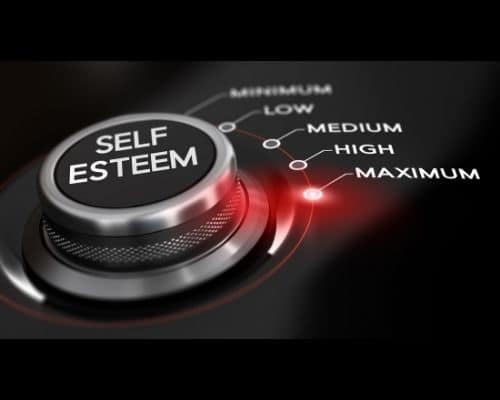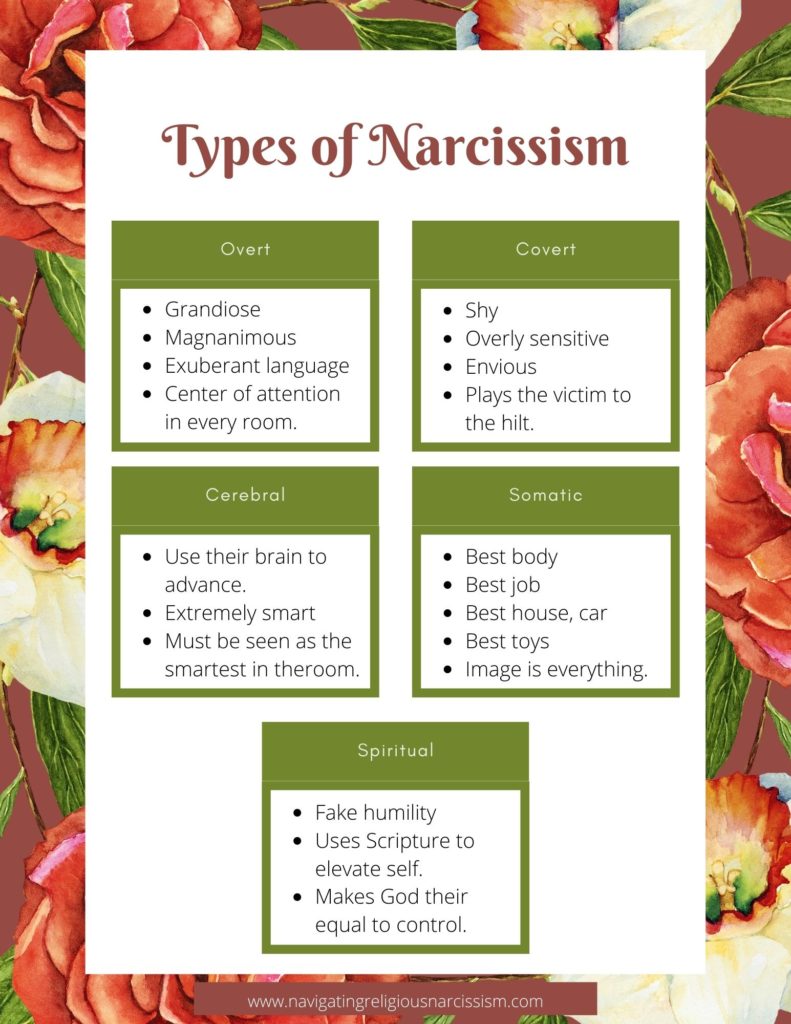Reviewed by Karis A. Williams, MSMHC, LPC, January 13, 2024
The word “narcissism” gets thrown around a lot. We use it to indicate anyone who thinks more highly of himself than he ought to. (I will be using the masculine pronoun throughout this article because the majority of people diagnosed with pathological narcissism are men. Women are also diagnosed accordingly; feel free to adjust the pronouns as necessary for your own situation.) Actually, the Cleveland Clinic estimates that around 5% of people have Narcissistic Personality Disorder, which is one of 10 personality disorders of which upward of 70% are male. So, while it is not as common as we throw it around, it is common enough that everyone knows at least a couple of them. So, what about when narcissism becomes pathological?
As a general rule, narcissism is considered pathological when both grandiose and vulnerable narcissism are present and a majority of the narcissism behaviors as described in the DSM-5 (Diagnostic and Statistical Manual of Mental Disorders, 5th Edition). Those who present at this level of narcissism show an extreme lack of ability to regulate themselves as normal in society, especially over the long term or as people they associate with get to know them. Often, they do not form close friendships in order to avoid being “discovered.”
Before we go on, let’s start with a clear definition of what I am referring to when I say the word “pathological.” According to Collins English Dictionary, the word pathological means “you describe a person or their behavior as pathological when they behave in an extreme and unacceptable way, and have very powerful feelings that they cannot control.” Their second definition is “relating to pathology or illness.” Both definitions fit simultaneously for the sake of this article. And on a final note, pathology is simply the way an illness or condition behaves, allowing it to be properly diagnosed.
Now that we have our terms well-defined, let’s take a look at what happens when narcissism crosses the line into pathological.
Table of Contents
What Makes a Narcissist Pathological?
Psychologists believe narcissism originates in childhood in a couple of different ways. Interestingly, these two ways are at opposite ends of the spectrum. The first is when in early childhood the parent exposes the child to excessivel amounts of neglect, criticism, and/or abuse. The child cannot bear the shame and must create a new identity that will face less scorn from the parents.
Second, also in early childhood, the parent extends excessive credit or praise to the child, lifting him or her up on a pedestal. In this case, the parent is actually the one creating the new identity that the child latches onto, truly believing they are better than everyone else. Later, when faced with failure, they can’t stand even the thought because they believe they are so above cultural norms and societal rules. They are the exception to the rules and expect to be treated as such.
These two theories are believed to be the predominant causes of narcissism. But there are additional contributing factors. They include:
- Learning manipulative behavior from parents or other authorities.
- Inconsistencies in child-rearing.
- Having excessively oversensitive tendencies.
Genetic as well as environmental factors can cause narcissism. Interestingly, there are even physical indicators in the brain that indicate narcissism. Brain scans have shown a lower volume of gray matter in the left anterior insula, which is the part of the brain related to empathy, emotional regulation, compassion, and cognitive function.
Also interestingly, psychologists observe that narcissism does not develop as a personality disorder until the teenage years or early adulthood, even though the trauma that caused it likely happened in early childhood.
A person is not considered pathologically narcissistic until they have a formal diagnosis from a psychologist.

How Can You Tell if Someone is a Pathological Narcissist?
Because there are 4 different manifestations of Narcissistic Personality Disorder, there will be different ways to determine if they are in fact narcissistic. They are the covert narcissist, cerebral narcissist, somatic narcissist, and spiritual narcissist. Each one has distinct characteristics that you would be able to identify them by. Let’s take a look.
Identifying a Covert Narcissist
Many people think all narcissists are grandiose and magnanimous. But there is a totally different side to the narcissist coin.
Covert narcissists tend to preent as shy, overly sensitive, and envious of what others have, even if they didn’t necessarily want it before. They play the victim to the extreme.
They still have a need for admiration and to be seen as the best person in the room (or world for that matter) but they will get their accolades in introverted and passive-aggressive ways instead of the outward ways that overt narcissists use.
Identifying a Cerebral Narcissist
The cerebral narcissist is exactly what it sounds like. They use their brain to get themselves ahead. They tend to be very sharp in their thought processes. Mine could remember every detail of every conversation we had–until it wasn’t convenient for him or he needed to change the details to suit his newly invented stories.
The cerebral narcissist needs to be seen as the smartest person in the room. They will do and say what it takes to get there, and they will disregard everyone around them to do it.
Identifying a Somatic Narcissist
A somatic narcissist is someone who must look the best in every way. They must be absolutely fit, wear only the best fashion, drive the best cars, have the best jobs, and be seen in only the best places.
Image is everything to them. Their entire self-worth is based on their appearance and how others perceive them.

Identifying a Spiritual Narcissist
A spiritual narcissist uses religion or spirituality to elevate themselves above everyone else. One of the ironic things about this is that they must make themselves look incredibly humble while using their act of humility to gain the upper hand. They use their “closeness to God” to make themselves look better than all the other spiritual or religious people they associate with. And they will use Scripture to hurt, control, or put others to shame.
Once my ex realized how far he could get using spiritual mask, it became his go-to identity. So many Christians want to believe his false persona that they are willing to overlook all of the evil to cling to what he wants them to see. I still see this even now on occasion. His new church was even willing to justify his divorce from me after our church, counselors, and several other helpers in the community tried to help them understand what my ex was doing to our family. They wanted to believe the lie, even though it was so obviously a lie.
Note:
Most narcissists are not exclusively one of these. In my case, my ex narcissist was a mixture of a covert and spiritual narcissist for the most part with a little bit of cerebral narcissist mixed in. As you interact more with your potential narcissist, it will make more sense to you.
Also, know that just because someone has some of these characteristics, it doesn’t make them a pathological narcissist. I’m sure that at one time or another, every person that has ever lived has done some of these things.
Also note, I did not talk about the overt, or grandiose, narcissist. Most people can identify that type from a mile away.
What are the Traits of a Pathological Narcissist?
When narcissism becomes pathological, there will be traits that stick out to you. You will suddenly realize why they do a lot of the things they do. Here is a list of the most prominent things:
- They may have several friends, but little to no close friends. If they were to have a close friend, they fear that friend would see all that they are hiding.
- If you are married to a narcissist, you will realize that bonding is limited. There is little to no emotional relationship. It feels like a business transaction.
- They will explode over the smallest amount of criticism. In fact, they cannot be seen as less than perfect and will not allow you to highlight anything accordingly.
- They truly believe that they are right and the rest of the world is wrong.
- They can always get further in their need to control people by compartmentalizing everyone. As long as everyone is isolated from everyone else, they can shift the truth as needed to keep up their fake persona.
- If you no longer play into their need for constant admiration, they will immediately discard you.
- They will “love bomb” anyone that they feel will be a good source of narcissistic supply to them. This is more than romantic love bombing. They will even treat distant acquaintances as though they are the most amazing person in the world if it means they will get admiration in return.
- Narcissists may take credit for work you have done. That allows them to get the accolades, raises, and general credit that you should have gotten.
- They believe they are entitle to whatever they can commandeer.
- And one more of the more prominent characteristics: they will belittle everyone around them to put themselves on top. Even in the middle of trying to make you feel like you are the best thing in the world while they are trying to get something from you. It will be the most confusing dance you do with another person. And that will make you a perfect target.
Is it Possible to Live With a Pathological Narcissist?
While there have been no cases of healing narcissism, there have been a few cases where the narcissists acknowledged their traits and agreed to work with their spouses to make things work. Every day seems to be an uphill battle. Narcissism shows up, they work through it, life gets better for a bit, the narcissism shows back up. And so the cycle goes on forever.
When narcissism becomes pathological, I don’t know if you can live together in a healthy and beneficial way. Can you coexist? On some level yes, but not in a way that is emotionally healthy. The hallmarks of narcissism are abuse. The constant back and forth while trying to counter the effects of narcissism are a roller coaster ride to say the least.
Well into the counseling process, I remember when I hit a crossroads. My counselor said I had to make a choice based on the information I now knew. I could stay with my narcissistic husband and maybe he would work with me to tone down the narcissistic behavior. Or I could leave and start a new life after nearly 30 years of marriage. (It was 2 months shy of 31 years when our divorce was final.) Neither choice sounded tenable at the time. And it took me a while to process and make the best decision.
I just know that after being stuck on that roller coaster of life with a narcissist for so many years, I knew I could not stay on the wild ride that would have continued. I also know that often when they realize you are going to stay and when you try to work through their issues, the abuse goes through the roof. And I knew I couldn’t do that.
Everybody has to make their own choice. But they will likely need a lot of support and love regardless of which decision they make.

How do you Deal With a Pathological Narcissist?
When a narcissist is or becomes pathological, sometimes you can simply walk away. That is certainly the case with acquaintances, friends, or people that you don’t have to see on a regular basis. But what about when the narcissist in your life is your spouse, parent, child, boss, coworker, or other person that you can’t simply walk away from? Life won’t be easy, but there are some great things you can do to gain your balance and emotional health back. Here are some of them.
When Your Narcissist Becomes Pathological, Set Boundaries
Boundaries are critical to keeping the narcissist from virtually owning you. They will walk all over you and then some. You are their ultimate doormat. But you don’t have to let them continue doing that to you.
Know that regardless of your relationship to the narcissist, they don’t own you. You are your own person. Even if you are married to the narcissist. I know my ex loved to give me the verse in 1 Corinthians 7 about my body was not my own but his and I could not refuse him. But that Scripture was not for the sake of allowing my husband to own me like property. It was more referring to the one-flesh relationship that we both should have been enjoying. Not obligatory here.
The book Boundaries by Henry Cloud and John Townsend was one of a handful of books that was instrumental to my healing. If you have read other articles I have written, you will know that already because I am always singing the praises of this book. Check it out for yourself here:
When Your Narcissist Becomes Pathological, Don’t Push Them to Change
When your narcissist becomes pathological, know that trying to force him to change for the better will only make him very angry. And it will make him “punish” you for making his life miserable and exposing his shame.
I worked with a team of counselors and church leaders who worked together with me as a triad of support for our marriage. It made my ex narcissist angry that he couldn’t isolate and triangulate us to continue the narcissistic abuse. He did not like having his feet held to the fire. And his response was to leave me, the church, and the counselors and start an entirely new life.
Just know that if your narcissist doesn’t want to heal, he won’t hang around to do the hard work, no matter how many people are there to support him through it.
When Your Narcissist Becomes Pathological, Remember C.O.R.E. Strength
This is from my other go-to resource. Leslie Vernick wrote in her book, The Emotionally Destructive Marriage, that regardless of whether you are in a difficult or destructive marriage, living in C.O.R.E. strength will enable you to regain your own emotional health. Here is what the acronym stands for:
C – I will be committed to truth, both internally in my own heart and mind and externally. I refuse to pretend.
O – I will be open to the Holy Spirit and wise others, teaching me, maturing me, and guiding me into his way of living my life.
R – I will be responsible for my own responses to destructive behavior and commit to being respectful without dishonoring myself.
E – I will be empathic and compassionate toward others without enabling people to continue to abuse and disrespect me.
In a response to a follower, she goes on to say, “When you know and believe that you are a loved, valuable, worthwhile human being and live from that core place, toxic people lose their power to manipulate you. They can’t control and intimidate you as they once did when you felt worthless, dependent and needy.”
If you are struggling with your marriage, you really need this book! It was a total game changer for me, especially in conjunction with counseling. This book begins with a test you can take to determine if you are in a difficult or destructive marriage. Then the book guides you through whichever circumstance you find yourself in. I love how it gives you the strength and wisdom to make your own decisions. You will emerge from this book a stronger person!
If you are struggling with other relationships, this book will still help you because it focuses on how to make yourself emotionally healthy no matter who you are relating to.
Can Pathological Narcissism be Cured?
When a narcissist becomes pathological, there is no set cure. There are a few ways it can be treated once it is diagnosed by a psychologist. But those ways primarily center around talk therapy and accountability. Here are the primary ways being used:
- Counseling with a counselor who is experienced in narcissistic issues. Make sure most sessions are with the narcissist alone and not with you if you are married. Narcissists will absolutely destroy their partners in the counseling office when they feel any amount of pushback on their bad behavior.
- Accountability is critical if your narcissist has agreed to any level of healing. Often they will agree to counseling so they sound like they are being agreeable to healing. And then they will do what it takes to make it go away. They will triangulate all parties involved. So if all of those parties involved stay on the same page, he won’t be able to play them against each other.
- Surround yourself with supportive people and document everything for as long as you are working with the narcissist. As long as he is willing to work with you, you will need all the support you can get.
Is There a Test for Pathological Narcissism?
The final thing I want to touch on here is whether there is a test for when your narcissist becomes pathological. And the answer is yes! There is a drawback, though. There are some good tests that are well known for their accuracy. But it is very difficult to get narcissists to take them. As long as they can convince themselves and others that there is nothing wrong with them, there is no reason to take a test.
My ex is actually one of the few narcissists that actually tested positive for narcissism. In our case, he dragged me to counseling in an attemp to make me fall in line. But the counselors saw what was really happening. So they told him that they always tested both spouses in order for one not to feel targeted. He went along with it thinking that he could pass any test and it would be my undoing. It ended up being the opposite.
First, the narcissist’s counselor will determine how many of the narcissistic behaviors their client has. Then, if it seems likely that he is a full blown narcissist, there are a couple of tests he can take. So, if you are lucky enough to get your narcissist to submit to a test, here are the three most popular ones:
- Personality Diagnostic Questionnaire-4 (PDQ-4).
- Millon Clinical Multiaxial Inventory III (MCMI-III).
- International Personality Disorder Examination (IPDE).
The one that we did was the MCMI-II, the precurser to the the one mentioned above.
It is important to note that even with a diagnosis in hand, nothing really changes as to treatment. If you throw the diagnosis in the face of a narcissist, it will not make him want to heal. It will make him want to kill you. Or do some other unspeakable harm. Seriously, it will make him very angry.
The treatment will still be as above. Talk therapy in the hopes of holding his feet to the fire until he just totally refuses. Which is how the vast majority of narcissistic relationships end.
If you liked this article, I think you will also love the following articles:
What to do When Your Narcissist Threatens You
The Bible Used as a Weapon Against You: You can Overcome!
What Does the Bible say About Abusive Husbands?
The Link Between Spiritual Abuse and Narcissism
What Does the Bible Say About Abusive Husbands?
The Link Between Spiritual Abuse and Narcissism
Can a Narcissist Change for Love?
Why are You Attracting Narcissists?
Why Narcissists Love Going to Church
Does a Narcissist Know They are a Narcissist?
How Religious Narcissists Think?
Can a Narcissist be a Good Person?
Narcissistic Behavior: What to Look Out For
Praying for Your Narcissistic Husband
Are Spiritual Narcissists Overt or Covert?
How to Navigate Religious Narcissistic Parents
What Happens to the Soul of a Narcissist?
How to Heal From a Spiritual Narcissist
Can You Maintain a Relationship With a Spiritual Narcissist?
Can Narcissists Have a Spiritual Awakening?
How Will God Judge a Narcissist?
When the Church Says to Move Back in With Your Narcissist
What Can We Say to a Friend Who’s Divorcing
23 Reasons Why Narcissists are Drawn to the Church
When the Church Doesn’t Recognize Narcissistic Abuse
Will the Church Support Divorcing a Narcissist?
What Does the Bible Say About Narcissism?
Can a Spiritual Narcissist Heal?
Can a Narcissist Be a Christian?
What Does the Spiritual Narcissist Do When You Try to Leave?
- How to Choose the Best Attorney When Divorcing a Narcissist - March 23, 2024
- Why Won’t God Heal my Narcissist? - February 28, 2024
- How Narcissists Use Religion to Control and Manipulate You - December 26, 2023







